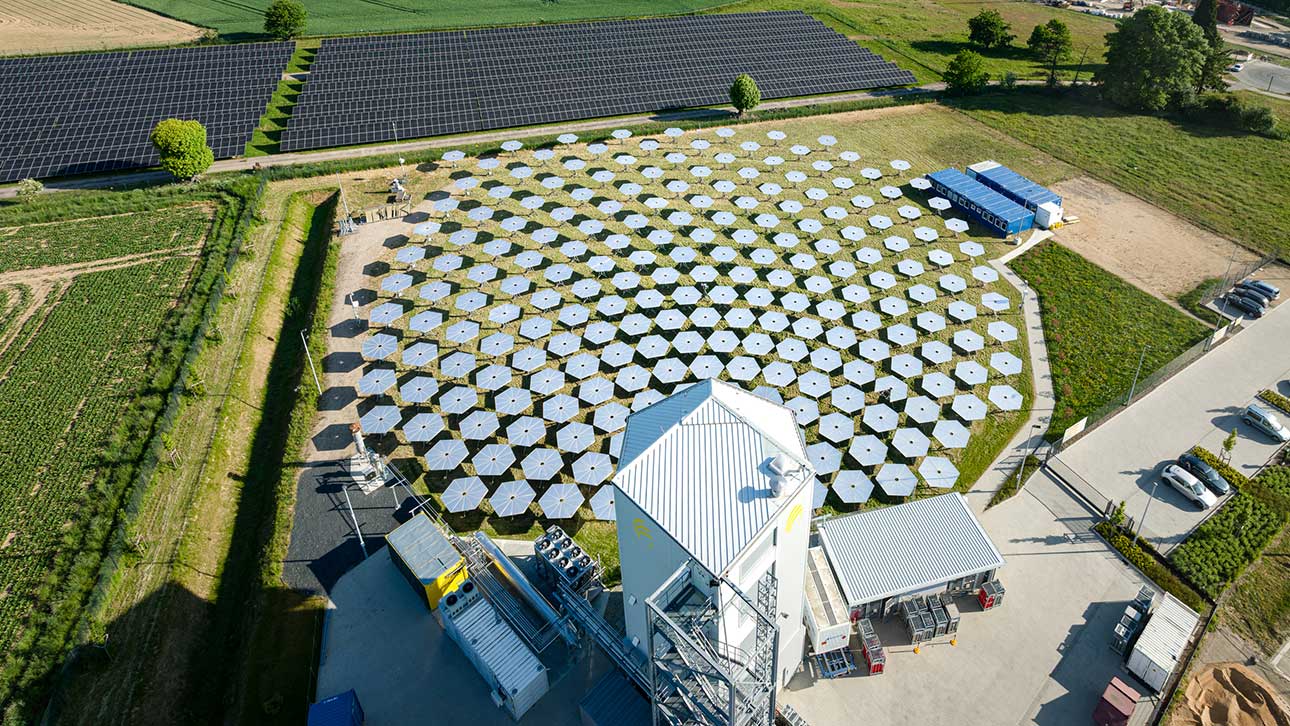Solar diesel, developed by the Swiss company Synhelion, is an innovative form of synthetic fuel produced from solar energy and carbon dioxide. It offers a realistic and scalable path toward sustainable transportation without requiring fundamental changes to existing fuel infrastructure.
As global industries search for alternatives to fossil fuels that ensure energy independence while reducing carbon emissions, solar diesel is emerging as a leading candidate. Based on concentrated solar power, this type of fuel has the potential to replace conventional fuels in aviation, heavy transport, and industrial sectors without the need for new infrastructure or engine modifications. Synhelion’s project is among the most advanced in the field, demonstrating both technical feasibility and economic viability.
How Solar Diesel Is Produced
At the core of the technology is the use of concentrated solar energy to drive a thermochemical process. This is achieved through a system of mirrors (heliostats) that track the sun and focus sunlight onto a central receiver embedded in a reactor. Inside the reactor, temperatures exceed 1500°C—conditions that enable the splitting of water (H2O) and carbon dioxide (CO2) into hydrogen (H2) and carbon monoxide (CO). The resulting syngas—a mixture of H2 and CO—is then processed via catalytic reactions into liquid hydrocarbons.
This process resembles the well-known Fischer–Tropsch synthesis, but with one major difference: the energy source is 100% renewable. The final product is solar diesel, whose chemical structure is identical to that of conventional diesel. This means it can be used directly within the existing fuel distribution and combustion infrastructure, including tanks, pipelines, and internal combustion engines.
Applications and Advantages
Solar diesel is particularly well-suited for sectors where electrification is difficult—such as aviation, maritime transport, and heavy-duty vehicles. Unlike electric or hydrogen-based systems, which require new infrastructure, solar diesel can be deployed immediately. Moreover, when produced using CO2 captured from the air or industrial sources, the fuel is completely carbon neutral. The CO2 released during combustion is equal to the amount used during production—resulting in zero net emissions.
Synhelion’s technology also allows flexibility in output: depending on market needs, the company can produce solar diesel, gasoline, or kerosene. This adaptability makes the technology relevant for various energy strategies and transportation modes, from aircraft to freight logistics.
Implementation and Industrial Scaling
In 2024, Synhelion launched its first pilot plant, Dawn, in Germany. This facility successfully demonstrated the full production cycle—from sunlight to ready-to-use fuel. The project serves not only as a technical proof of concept but also as a demonstration site for potential partners and investors. The next step is the construction of a commercial-scale facility in Spain, leveraging the region's high solar irradiance to produce large volumes of synthetic fuels.
The company is focused on scaling the technology to achieve cost reduction and industrial efficiency. Its long-term goal is to build solar fuel refineries in sun-rich regions such as Southern Europe, the Middle East, North Africa, and Australia—maximizing productivity through optimal solar conditions.
Partnerships and Development Outlook
Synhelion has already established strategic partnerships with major players in the transportation and energy sectors, including airlines like SWISS and Lufthansa, and institutions such as ETH Zurich. These collaborations provide not only technical support but also access to real-world implementation channels. By 2030, the company aims to produce millions of liters of solar fuel annually and become a key supplier of carbon-neutral energy for aviation and beyond.
Challenges to widespread deployment include the capital intensity of initial plant construction and the need for a supportive regulatory environment. However, the technological maturity of the solution and the accelerating global push for decarbonization place Synhelion in a strong position for growth.
Solar diesel, produced through concentrated solar energy, is more than just a scientific innovation—it’s a practical and scalable solution for the future of sustainable transport. With proven technology and growing industry partnerships, Synhelion is positioning itself as a pioneer in the shift toward synthetic fuels with net-zero carbon impact. In a world grappling with climate change and energy transition, solar diesel strikes a powerful balance between innovation, feasibility, and environmental responsibility.

Dr. Yordan Balabanov
Expert in digital transformation, strategic approaches, and technology integration.
Words from the author:
“Digital transformation is not limited to technology implementation. It is a synergy of digital culture, strategic thinking, and expert competence – a long-term process that requires vision, knowledge, and resilience.”
LinkedIn | yordanbalabanov.com
Are you ready for strategic change through digitalization? Contact me for professional support.
Was this insight valuable to your business?
Download our free app TemplinTech Magazine on Google Play – no ads, no distractions, just focused business insights.
📲 Install from Google Play
![Български [BG] Български [BG]](/media/mod_languages/images/bg_bg.gif)
![English [EN] English [EN]](/media/mod_languages/images/en_gb.gif)











